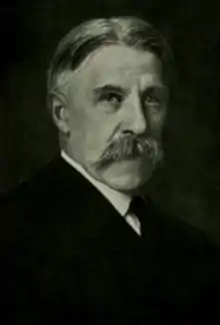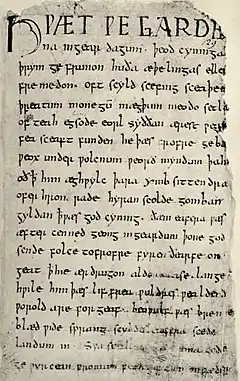Francis Barton Gummere
Francis Barton Gummere (b. Burlington, New Jersey March 6, 1855 - d. Haverford, Pennsylvania May 30, 1919) was an influential scholar of folklore and ancient languages, a student of Francis James Child.

Early life
Gummere was a descendant of an old German-American Quaker family; his grandfather John Gummere (1784-1845) was one of the founders of the Haverford School, which became Haverford College, of which Gummere's father Samuel James Gummere (1811-1874) was the first president.[1] Gummere's father became the president of the college in 1862, when Gummere was 7, and Gummere graduated from Haverford at the age of 17. After working for several years, he returned to study and received an A.B. from Harvard University and an A.M. from Haverford in 1875. From 1875 to 1881 he taught at the Moses Brown School in Providence, Rhode Island, where his father had taught some years previously. During these years he took trips to Europe to pursue further studies, ultimately earning a PhD magna cum laude at Freiburg in 1881.
Later academic career
After a year teaching English at Harvard, Gummere spent five years as the headmaster of the Swain Free School in New Bedford, Massachusetts. In 1887 he became an English professor at Haverford, a position he held until his death on May 30, 1919. One of his best known ideas was his theory of communal composition of ballads, articulated in his 1911 book Democracy and Poetry. Gummere served as president of the Modern Language Association in 1905.[2]
Beowulf translation
Gummere was also a translator; his Beowulf was published in 1910 as part of the Harvard Classics series.[3] In 1991 John Espey wrote of Gummere's Beowulf, "it remains the most successful attempt to render in modern English something similar to the alliterative pattern of the original", in a review of an audiobook version of Gummere's Beowulf by George Guidall.[4] A graphic novel version of Beowulf by Gareth Hinds published in the 2000s uses Gummere's translation.
| Old English verse | Gummere's translation[5] |
|---|---|
Ðá cóm of móre | under misthleoþum |
Then from the moorland, by misty crags, |
In memoriam
One of Gummere's students was writer Christopher Morley, whose memoriam on Gummere was part of his 1922 essay collection Plum Pudding.[6]
Family
Gummere married Amelia Smith Mott (1859-1937) in 1882; she was a noted scholar of Quaker history. Their son Richard Mott Gummere was a professor of Latin and headmaster of the William Penn Charter School. Their second son Samuel James Gummere had a military career, reaching the rank of major. A third son, Francis Barton Gummere Jr., was an invalid.
Works
- The Anglo-Saxon Metaphor, 1881
- A Handbook of Poetics, 1885
- Germanic Origins: A study in primitive culture, 1892. Republished in 1930 as Founders of England with notes by Francis Peabody Magoun.
- Old English Ballads, 1894
- The Beginnings of Poetry, 1901
- The Popular Ballad, 1907
- The Oldest English Epic, 1909
- The Democracy of Poetry, 1911
References
- "Francis Barton Gummere", John Matthews Manly, Modern Philology, Sept. 1919, p. 241-246
- list of past presidents, MA website
- Gummere, Francis B. (1910). Beowulf. Harvard Classics. Retrieved 22 October 2020.
- Los Angeles Times, February 17, 1991
- Beowulf translated by Frances B. Gummere. Poetry Foundation
- In Memoriam: Francis Barton Gummere, by Christopher Morley
External links
- Works by or about Francis Barton Gummere at Internet Archive
- Works by Francis Barton Gummere at LibriVox (public domain audiobooks)

